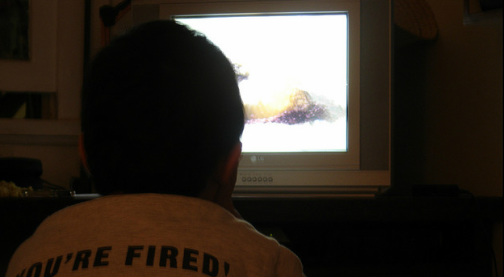|
They Take Their Lead From You. Make Healthy Choices and Your Kids Will Too.
Help Them Try New Foods.
Picky Eating is Temporary.
Play Actively Every day.
Article courtesy of http://www.choosemyplate.gov/food-groups/downloads/Pointers4Preschoolers.pdf. For more tips, information and resources on helping children learn good health habits, visit http://www.choosemyplate.gov/print-materials-ordering.html
0 Comments
Treasure Attic is an exciting video series for children from 2 to 8 years of age. Full of fun and adventure, this series teaches children universal moral principles and values through story and song. Each half hour episode of Treasure Attic features its fun and personable host, Uncle Jim, his loveable sheepdog, Peepers, the energetic, word-defining Bunny Big Bigword and many other friendly animal puppets! Treasure Attic focuses on skills children need most:
Another plus is that each DVD includes three languages (English, Spanish and Portuguese), making these videos a good teaching tools for children who are learning a second language. Treasure Attic is recommended by the DOVE foundation as being a family friendly video series. These videos have been seen on stations around the world, have sold over 500,000 copies to date and have a dedicated following of happy viewers. You can view portions of these videos here or buy the DVDs online by clicking here. This free Treasure Attic guide and songbook is designed to help parents and teachers use these videos to their fullest potential. The guide can be read online or downloaded by clicking the download PDF icon. (Right click the file icon and then selecting “save as…” or “save file as”…
By Bonita Hele Dear Jesus, bless the mothers who sat up again last night, soothing their crying, colicky babies. Bless the mothers who read the same favorite bedtime story night after night, even though they could recite it in their sleep. Bless the mothers who keep a treasured collection of their children’s artwork, from the first scribble to the latest masterpiece. Bless the mothers who help support their families, even when it means going to work with spit-up on their blouses, diapers in their purses, and teething rings on their key chains. Bless the mothers who cheer the child who scored the winning goal, and bless the mothers who cheer on the child who has never scored a goal. Bless the mothers who care for their sick children, treasuring the extra time together rather than begrudging the extra work. Bless the mothers who daily teach their children the ways of love, peace, forgiveness, tolerance, and humility by their example. Bless the mothers who teach their children to fold their hands in prayer, even before they can say a word. Bless the mothers who acknowledge their mistakes and ask You to make up for their lacks. Bless the mothers who never tire of praying for their children. Bless the mothers who aren’t a picture of perfection but a personification of love. Thank You, Lord, for mothers—old pro, rookie, or soon-to-be, single or married, rich or poor, mothers of their own children or mothers to the motherless—because without them we would not know that most beautiful thing, a mother’s love. By Bonnie Rochman, TIME, Feb. 18, 2013 If parents can’t limit their children’s TV time, then they can at least try to improve what youngsters are watching. That’s the if-you-can’t-beat-them-join-them approach that researchers in Seattle took in trying to address the issue of how much TV children, including toddlers, watch every day. Despite admonitions from experts and an emerging body of research that suggests children shouldn’t be watching more than two hours a day, the typical U.S. tot spends about four and a half hours parked in front of a television daily. Campaigns to reduce this screen time have clearly been only minimally successful. So by shifting the focus away from how much youngsters watch and concentrating instead on what they’re seeing, the researchers report in the journal Pediatrics on their success in helping parents to increase the time kids spent watching educational programming. The result? Better-behaved children. “There is no question kids watch too much television at all ages,” says Dimitri Christakis, lead author and director of the Center for Child Health, Behavior and Development at Seattle Children’s Research Institute. “Part of the message is not just about turning off the television but about changing the channel.” Kids are sponges who absorb their surroundings; it’s how they learn to develop the proper behaviors and responses to social situations. And they are not only parroting their parents and other family members, but mimicking behaviors they see on television or in movies as well. So Christakis, who has conducted extensive research on the effects of screen time on child development, explored ways to influence what shows children watch so that they’re more apt to imitate quality conduct. “We’ve known for decades that kids imitate what they see on TV,” he says. “They imitate good behaviors and they imitate bad behaviors.” In the study, he and his colleagues tracked 617 families with kids between the ages of three and five. Half of the families agreed to go on a media “diet” and swap programming with more aggressive and violent content for educational, pro-social shows that encourage sharing, kindness and respect, such as Dora the Explorer, which teaches how to resolve conflicts, and Sesame Street, which models tolerance for diversity. The other families did not change their children’s viewing choices. To help parents in the first group to choose appropriate shows, they received a program guide that highlighted prosocial content and learned how to block out violent programming. (The parents were so delighted with the guidance that many asked to continue receiving program guides even after the study ended.) They were also urged to watch alongside their kids. The researchers tracked what the children watched and also measured their behavior with standard tests of aggressiveness and sharing responses six months and a year into the study. At both testing periods, the children in the first group watched less aggressive programming than they did at the beginning of the study compared to children in the control group. Both groups of kids upped their screen time a bit, but the first group saw more quality programs while the control group spent even more time watching violent shows. Six months after the study began, the children who increased their pro-social viewing acted less aggressively and showed more sharing and respectful behaviors compared to the control group. They were more apt to compromise and cooperate than children who didn’t change their viewing content, and the effects persisted for the entire year that the study lasted. “There is a connection between what children watch, not just in terms of violence but in terms of improved behavior,” says Chistakis, who is also a professor of pediatrics at the University of Washington. Who got the biggest boost in behavior? Low-income boys. “They derived the greatest benefit, which is interesting because they are most at risk of being victims and perpetrators of aggression,” he says. Photo courtesy of Victor.Correa/Flickr.com By Hannah Richardson, BBC News education reporter
Children should be allowed to get bored so they can develop their innate ability to be creative, an education expert says. Dr Teresa Belton told the BBC cultural expectations that children should be constantly active could hamper the development of their imagination She quizzed author Meera Syal and artist Grayson Perry about how boredom had aided their creativity as children. Syal said boredom made her write, while Perry said it was a "creative state". The senior researcher at the University of East Anglia's School of Education and Lifelong Learning interviewed a number of authors, artists and scientists in her exploration of the effects of boredom. She heard Syal's memories of the small mining village, with few distractions, where she grew up. Dr Belton said: "Lack of things to do spurred her to talk to people she would not otherwise have engaged with and to try activities she would not, under other circumstances, have experienced, such as talking to elderly neighbours and learning to bake cakes. "Boredom is often associated with solitude and Syal spent hours of her early life staring out of the window across fields and woods, watching the changing weather and seasons. "But importantly boredom made her write. She kept a diary from a young age, filling it with observations, short stories, poems, and diatribe. And she attributes these early beginnings to becoming a writer late in life." 'Reflection'The comedienne turned writer said: "Enforced solitude alone with a blank page is a wonderful spur." While Perry said boredom was also beneficial for adults: "As I get older, I appreciate reflection and boredom. Boredom is a very creative state." And neuroscientist and expert on brain deterioration Prof Susan Greenfield, who also spoke to the academic, recalled a childhood in a family with little money and no siblings until she was 13. "She happily entertained herself with making up stories, drawing pictures of her stories and going to the library." Dr Belton, who is an expert in the impact of emotions on behaviour and learning, said boredom could be an "uncomfortable feeling" and that society had "developed an expectation of being constantly occupied and constantly stimulated". But she warned that being creative "involves being able to develop internal stimulus". "Nature abhors a vacuum and we try to fill it," she said. "Some young people who do not have the interior resources or the responses to deal with that boredom creatively then sometimes end up smashing up bus shelters or taking cars out for a joyride." 'Short circuit'The academic, who has previously studied the impact of television and videos on children's writing, said: "When children have nothing to do now, they immediately switch on the TV, the computer, the phone or some kind of screen. The time they spend on these things has increased. "But children need to have stand-and-stare time, time imagining and pursuing their own thinking processes or assimilating their experiences through play or just observing the world around them." It is this sort of thing that stimulates the imagination, she said, while the screen "tends to short circuit that process and the development of creative capacity". Syal adds: "You begin to write because there is nothing to prove, nothing to lose, nothing else to do. "It's very freeing being creative for no other reason other than you freewheel and fill time." Dr Belton concluded: "For the sake of creativity perhaps we need to slow down and stay offline from time to time." Encouragement for parents whose child is sick Words from Jesus, received in prophecy Watching your child suffer through an illness is usually far more difficult than enduring it yourself. But when you are faced with such a situation, remember that I can bring beauty and purpose out of even the saddest or most difficult circumstances. Whether your child is sick with a bad cold or flu, or endures a long-term affliction, or has been hospitalized, I am watching over your child. I love your child, and I do all things well. If you are facing such a heartbreak, remember that I know your child best and love him even more deeply and dearly than you. I am so proud of you for facing this great difficulty in your child’s life with faith and trust in Me. I know it’s not easy to go through. It’s heartbreaking. I’m so proud of you for trusting Me to bring you through, despite how difficult it is for you and your child at this time. I promise that I will bring you through. I and My angels are at your side to bring peace, comfort, and supernatural grace to see you through. I am sending waves of relief and touches of grace and healing to your child. I’m blessing you with healing, relief, hope, courage, faith, and the path to victory in these circumstances and difficulties. I will never allow you to endure more than you can bear. I will never allow your child more than he or she can bear. I will not fail to fulfill this promise in your child’s life. I will make a way of escape. Everything passes, even things that seem as if they’ll last forever. So during times when you find the battles of this life hard to bear, and they feel unending and unmerciful, know and trust My promise that they will not last forever. This will pass in My perfect time, and until the battle comes to an end, My grace will be poured out upon you in abundance. When your child goes through pain and difficulty, be encouraged to know that I am with him through it all. Even if healing doesn’t come immediately, you can know that I’m filling his life and heart and spirit with special treasures. It’s easy to feel that I am distant from you or your child when your child is sick or afflicted. But nothing could be further from the truth. It is in these times that I am closest to you and your loved one. It is one of the most difficult things in life to see a child suffer. But remember that My little ones behold My face, and in that beholding they receive strength to endure. Their spirits are strong and resilient, because they are close to Me. I give grace equal to the trial, even at such a young age. I give My grace to your child when he needs it most. I do not leave My children comfortless. Text copyright The Family International. |
Categories
All
Archives
March 2024
LinksFree Children's Stories |
||||||||







 RSS Feed
RSS Feed
